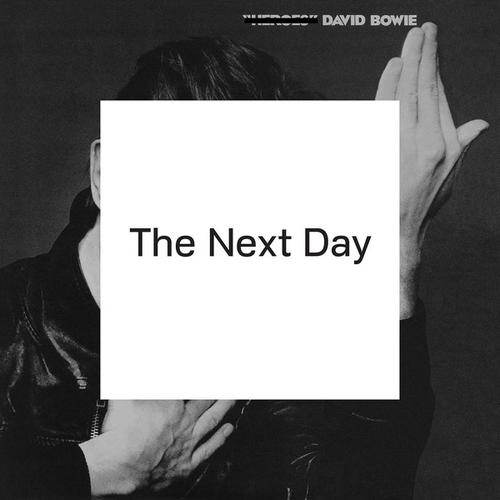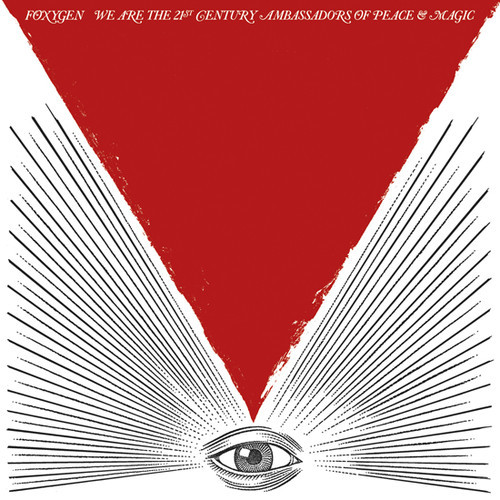I recall 2011 was a major disappointment for music aside from the outstanding Let England Shake, and I honestly can’t remember anything about 2012. Except for Lonerism, Bloom from Beach House, and Heaven from The Walkmen. Also, that Peaking Lights album Lucifer. I think Jack White’s solo album came out that year as well. Never mind.
2013 was another fairly decent year for music (or perhaps I actually paid attention this year, who knows?). Full disclaimer: I am not a professional music critic, nor do I work at a music store, nor do I frequent music stores enough to know all the super-cool underground indie bands that would populate this list had it been written by someone who works for Amoeba. I’m just some guy with some disposable income.
That said, let’s begin!
10. The Flaming Lips, The Terror
More of an honorable mention than anything else, The Terror only truly came alive when I saw The Lips perform these songs live. For some reason, the image of Wayne Coyne surrounded by Christmas lights holding a plastic infant helped me make sense of these songs.
9. Atoms For Peace, AMOK
At its worst, The King of Limbs sounds like a Thom Yorke solo record. At its best, AMOK sounds like a Thom Yorke solo record.
8. Sigur Rós, Kveikur
 Surprisingly rocking album from a band that inadvertently scored a horde of teenage suicides since 1999. I’m hopeful that they continue down this path for at least one more album, and then perhaps it’s time to call it quits given that one of the founding members pulled a Bill Berry earlier this year. And who really needs another Ágætis Byrjun, anyway?
Surprisingly rocking album from a band that inadvertently scored a horde of teenage suicides since 1999. I’m hopeful that they continue down this path for at least one more album, and then perhaps it’s time to call it quits given that one of the founding members pulled a Bill Berry earlier this year. And who really needs another Ágætis Byrjun, anyway?
7. Arcade Fire, Reflektor
 Did you know Arcade Fire put out an album this year? You didn’t? How? Even my mom heard about it. Despite the annoying media barrage that was the pre-release hype for this album and the absurd request to wear formal clothing to their arena shows this year, Reflektor turned out to be a pleasant and dance-y (if slightly overlong) surprise. If Arcade Fire is still intent on following U2 on their artistic Hajj, I suspect their next album will at least attempt to revitalize late-90s electronica. Is Reflektor Arcade Fire’s Achtung Baby? Probably.
Did you know Arcade Fire put out an album this year? You didn’t? How? Even my mom heard about it. Despite the annoying media barrage that was the pre-release hype for this album and the absurd request to wear formal clothing to their arena shows this year, Reflektor turned out to be a pleasant and dance-y (if slightly overlong) surprise. If Arcade Fire is still intent on following U2 on their artistic Hajj, I suspect their next album will at least attempt to revitalize late-90s electronica. Is Reflektor Arcade Fire’s Achtung Baby? Probably.
6. The National, Trouble Will Find Me
 It’s hard to fault a band for being consistently great even if they stick a little too close to their guns. I suppose the well of their creative output has yet to run dry considering how much I enjoyed these songs.
It’s hard to fault a band for being consistently great even if they stick a little too close to their guns. I suppose the well of their creative output has yet to run dry considering how much I enjoyed these songs.
5. Neko Case, The Worse Things Get, the Harder I Fight, the Harder I Fight, the More I Love You
 The Worse Things Get will hold me over just fine until St. Vincent’s concept album about masturbation comes out next year. There are truly some wacky one-offs on this one including an a cappella track about being told to fuck off by your mother. And in case you were wondering if it did happen, it did indeed happen. Neko remembers.
The Worse Things Get will hold me over just fine until St. Vincent’s concept album about masturbation comes out next year. There are truly some wacky one-offs on this one including an a cappella track about being told to fuck off by your mother. And in case you were wondering if it did happen, it did indeed happen. Neko remembers.
4. David Bowie, The Next Day
 The last I remember from David Bowie was his hilarious guest appearance on Extras a few years back. I didn’t realize that when The Next Day released earlier this year that it was his first record in 10 years. I suppose the gestation period between albums grows as you get older. Who knows? I’ve had this one on repeat for the past two weeks.
The last I remember from David Bowie was his hilarious guest appearance on Extras a few years back. I didn’t realize that when The Next Day released earlier this year that it was his first record in 10 years. I suppose the gestation period between albums grows as you get older. Who knows? I’ve had this one on repeat for the past two weeks.
3. My Bloody Valentine, m b v
 I was caught off guard by this one. I was expecting some sort of marriage between Isn’t Anything and Loveless; what I wasn’t expecting was how bonkers this record actually turned out to be. Everything about this album is beautiful, from its opening noise-pop rockers, to its lullaby middle section, and finally to its Sonic Youth-esque implosion at the end. It’s a fitting end to a trilogy of albums that started all the way back in 1988.
I was caught off guard by this one. I was expecting some sort of marriage between Isn’t Anything and Loveless; what I wasn’t expecting was how bonkers this record actually turned out to be. Everything about this album is beautiful, from its opening noise-pop rockers, to its lullaby middle section, and finally to its Sonic Youth-esque implosion at the end. It’s a fitting end to a trilogy of albums that started all the way back in 1988.
2. Deerhunter, Monomania
 It’s almost a courtesy that any album released by Deerhunter would occupy a spot on my top ten list after the love affair I had with Halcyon Digest. This one is decidedly dirtier, sludgier, and noisier than their previous albums. The perfect album to listen to during a drinking binge.
It’s almost a courtesy that any album released by Deerhunter would occupy a spot on my top ten list after the love affair I had with Halcyon Digest. This one is decidedly dirtier, sludgier, and noisier than their previous albums. The perfect album to listen to during a drinking binge.
1. Foxygen, We Are the 21st Century Ambassadors of Peace & Magic
 What a perfect and unexpected blend of Blonde on Blonde-era Dylan, psychedelia, and 60s revival. Contains probably my favorite track of the year as well.
What a perfect and unexpected blend of Blonde on Blonde-era Dylan, psychedelia, and 60s revival. Contains probably my favorite track of the year as well.



